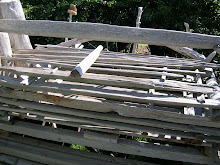 On an eight hour car trip as I left town, I heard on the radio a woman describe some aspects of living silently for 12 years. Suddenly my trip in relation to her experience became playful. My seven additional hours shrank in perspective to her 12 years. She said the hardest aspect of the process, holding her self as an empty vessel with empty thoughts and empty feelings challenged her sense of being. This sets up a challenge for my hours. How easily can I play outside of the time frame? Each time I found myself measuring time by distance from my goal, I would return to her words about emptiness. Then I come back to the present moment, being empty and notice the surroundings whizzing by. Landscape in motion becomes a more engaging stimulus than places I knew I would eventually come to along the way. The eventual landmarks that I had used to measure my progress made me feel distant from my goal. These landscapes interest me. I feel more comfortable here than anywhere else at this particular moment. I just hold the empty space.
On an eight hour car trip as I left town, I heard on the radio a woman describe some aspects of living silently for 12 years. Suddenly my trip in relation to her experience became playful. My seven additional hours shrank in perspective to her 12 years. She said the hardest aspect of the process, holding her self as an empty vessel with empty thoughts and empty feelings challenged her sense of being. This sets up a challenge for my hours. How easily can I play outside of the time frame? Each time I found myself measuring time by distance from my goal, I would return to her words about emptiness. Then I come back to the present moment, being empty and notice the surroundings whizzing by. Landscape in motion becomes a more engaging stimulus than places I knew I would eventually come to along the way. The eventual landmarks that I had used to measure my progress made me feel distant from my goal. These landscapes interest me. I feel more comfortable here than anywhere else at this particular moment. I just hold the empty space.In the last half hour I got trapped in a narrow space about saying goodbye to old friends from whom I had grown distant. We all seem to have lost the ability to say goodbye. Something about the pain of leaving, or the potential finality of time apart tricks us into the myth that if we don’t say goodbye, we will avoid the pain. The amazing part of the driving experience became how I couldn’t release my old friends. They ended up filling me and the car and the landscape. It almost seemed like a joke. She had said the practice challenged her out of her comfort. I only now see an element of humor in the final experience of filling myself with unresolved conflict at the end and supposedly easy part of the drive. The end of the trip filled time in a very different way. I can mistakenly pay too much attention to the end. Our minds play with time even when we think we don’t. Do we need remedial courses on play so we stop filling time?
By focusing in this manner, we play with time again.

Layers of experience can be interrelated that occur for each of us at different points in our process of exploring play. I enter the text now and when I had written in this chapter before. Playfully there could be a whole set of annotations that indicate the number of times, the time and place of writing. Sadly not to have this detail hides connections. Though over the last three (four, six, eight) years as the text develops there have been times when this page has been imagined in very different forms. Time still separates these layers. First the text appears in a composition book on a warm Mexican winter morning. Once it arranges itself on a bank brochure in a Swiss mountain spa. Then it settles into computer files. Geographical locations separate the threads. Each writing evoked different feelings. Playfulness returns with the layering of the ideas.
The text gestates. It hibernates. I include a type of journal that speaks about my play thoughts, using lines and points on flat pages. I am wrapping the basic text with a veil of thoughts about play to encourage several ways of looking at the experience as we live it.

No comments:
Post a Comment